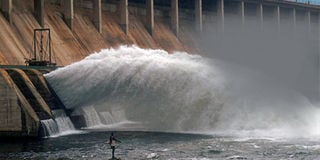Presidential candidates on energy

Owen Falls dam
What you need to know:
Pledges. Four candidates promise to increase access to electricity and allocate bigger budgets to the energy sector
Yoweri Kaguta Museveni
1. Completing the 26 power plants currently under or about to start getting construction
2. Completing six transmission lines
3. Increasing power generation capacity to drive economic development.
4.The NRM Government will build additional electricity generating capacity at Murchison Falls (700mW), Oryang (392mW), Uhuru (350mW), Kiba (300mW), and Albatros thermal plant (50mW). This will give Uganda a capacity of 4,356MW. We will also explore and develop another 300MW of electricity from the geo-thermal potential in the country. The Rwenzori region, the Ebitagata in the Katwe area has the potential to generate energy.
5.Expanding the electricity transmission grid network.
6.Increasing energy efficiency.
7.Promoting the use of alternative sources of energy , including continuing to build the capacity needed to exploit nuclear energy using the locally available uranium deposits.
8.Strengthening the policy, legal and institutional framework.
9.Connect Buliisa, Adjumani, Moyo and Otuke districts, to the national grid, as well as complete supply to Nwoya, Kotido, Kaabong and Buvuma.
Kizza Besigye
The Message: Access to energy services will facilitate economic development that assist in eradicating poverty, empowering women and enhancing educational opportunities.
1. Generation capacity will be fast tracked to reach 4,000MW by 2021. As part of this plan, the FDC led government will create incentives and develop appropriate partnerships to fast track the design and implementation of other renewal energy sources with particular emphasis on solar energy, wind energy, biomass energy, and geothermal.
2. Double connectivity currently estimated at 14% in order to reach 28 percent national connection by 2021. We must move away from the incumbent regime’s practice of measuring progress by looking at the coverage of transmission lines and focus on how many of our people are connected to the grid or can access clean energy.
3. Provide funding and establish modalities for setting up a renewable energy research and training institute.
4. Provide financial and other incentives to Ugandan firms that develop ideas and business plans to invest in the generation of renewable and energy research.
Amama Mbabazi
The promise: In order to promote our socio-economic growth for both domestic and industrial consumption, the power sector has to be efficient and provide adequate, reliable and low-cost power. Access to electricity should cover the entire country.
1.To increase accessibility to electricity to 40% of the population within 2 years and 60% by 2021.
2.Increase the power supply by 3,500 mW in the next 5 years by continuing to build the planned hydropower dams, initiating new renewable energy projects and by signing new bilateral agreements for the supply of electricity with the Democratic Republic of Congo and Ethiopia.
3.Promote the use of Renewable Energy especially solar power, biomass and hydropower.
4.Our government will work to reduce the cost of electricity per unit consumed.
5.Using a unique home based grid-tie solar system (proposed 5 panel system), every connected home will save on average Shs960,000/= per year.
6.Our proposed Grid-tied solar system will help increase our power supply per capita while making power more economical in the long run for consumers.
7.This innovation is unique for two reasons; It is a revenue source that helps your family or household to reduce expenses and instead save money to spend on other essentials such as school fees or health insurance premiums.
8.Being a clean energy source, this initiative qualifies Uganda for carbon tax credits from industrial countries.
9.We will zero rate (exempt) Value Added Tax on medium and large commercial electricity consumers.
10.We shall scrap taxes imposed on electricity used for production.
11.We will extend our electricity distribution network to all the 1,388 sub-counties. A solar electricity support system will immediately be installed at those sub-counties that will not have been served by the national electricity distribution network.
Prof Venansius Baryamureeba
1.Allocate at least 6% of the national budget to energy and natural resources
2.Promote and support the production of improved cooking stoves for rural communities and for urban communities promote the use of electricity, gas and solar as sources of energy.
3.Wood energy which most Ugandans depend on should be discouraged but instead we should focus on the use of clean energy from solar, wind, hydro power, biogas, and oil.
4.Develop a comprehensive national infrastructure policy framework hat shall guide the energy sector when coming up with specific sectoral policies on Infrastructure
5.In partnership with the private sector promote and develop other sources of energy like from solar, wind, biogas, and oil.




